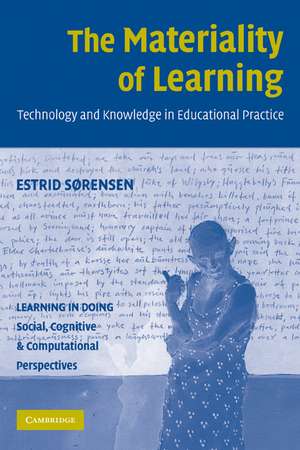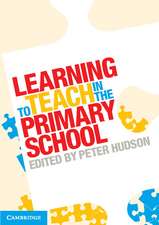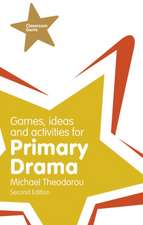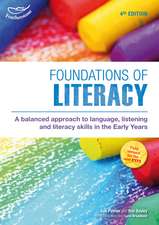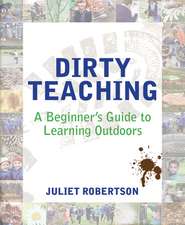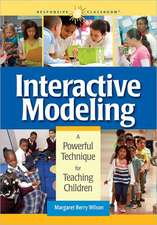The Materiality of Learning: Technology and Knowledge in Educational Practice: Learning in Doing: Social, Cognitive and Computational Perspectives
Autor Estrid Sørensen PhDen Limba Engleză Paperback – 16 feb 2011
| Toate formatele și edițiile | Preț | Express |
|---|---|---|
| Paperback (1) | 281.67 lei 6-8 săpt. | |
| Cambridge University Press – 16 feb 2011 | 281.67 lei 6-8 săpt. | |
| Hardback (1) | 512.98 lei 6-8 săpt. | |
| Cambridge University Press – 26 apr 2009 | 512.98 lei 6-8 săpt. |
Din seria Learning in Doing: Social, Cognitive and Computational Perspectives
-
 Preț: 311.66 lei
Preț: 311.66 lei - 9%
 Preț: 695.96 lei
Preț: 695.96 lei -
 Preț: 319.43 lei
Preț: 319.43 lei -
 Preț: 228.66 lei
Preț: 228.66 lei -
 Preț: 201.39 lei
Preț: 201.39 lei - 11%
 Preț: 493.04 lei
Preț: 493.04 lei -
 Preț: 281.88 lei
Preț: 281.88 lei -
 Preț: 431.40 lei
Preț: 431.40 lei - 14%
 Preț: 900.82 lei
Preț: 900.82 lei -
 Preț: 326.53 lei
Preț: 326.53 lei -
 Preț: 346.50 lei
Preț: 346.50 lei -
 Preț: 296.65 lei
Preț: 296.65 lei -
 Preț: 292.45 lei
Preț: 292.45 lei - 20%
 Preț: 279.91 lei
Preț: 279.91 lei - 11%
 Preț: 459.10 lei
Preț: 459.10 lei -
 Preț: 357.13 lei
Preț: 357.13 lei - 11%
 Preț: 526.58 lei
Preț: 526.58 lei - 14%
 Preț: 784.65 lei
Preț: 784.65 lei -
 Preț: 320.66 lei
Preț: 320.66 lei - 11%
 Preț: 512.98 lei
Preț: 512.98 lei -
 Preț: 332.97 lei
Preț: 332.97 lei - 11%
 Preț: 690.80 lei
Preț: 690.80 lei - 11%
 Preț: 444.70 lei
Preț: 444.70 lei -
 Preț: 324.15 lei
Preț: 324.15 lei -
 Preț: 350.97 lei
Preț: 350.97 lei -
 Preț: 392.00 lei
Preț: 392.00 lei - 20%
 Preț: 516.51 lei
Preț: 516.51 lei -
 Preț: 330.33 lei
Preț: 330.33 lei - 14%
 Preț: 786.15 lei
Preț: 786.15 lei - 5%
 Preț: 321.87 lei
Preț: 321.87 lei -
 Preț: 350.21 lei
Preț: 350.21 lei -
 Preț: 321.27 lei
Preț: 321.27 lei - 14%
 Preț: 726.60 lei
Preț: 726.60 lei -
 Preț: 339.96 lei
Preț: 339.96 lei
Preț: 281.67 lei
Nou
Puncte Express: 423
Preț estimativ în valută:
53.90€ • 56.39$ • 44.77£
53.90€ • 56.39$ • 44.77£
Carte tipărită la comandă
Livrare economică 02-16 aprilie
Preluare comenzi: 021 569.72.76
Specificații
ISBN-13: 9780521182713
ISBN-10: 0521182719
Pagini: 226
Dimensiuni: 152 x 229 x 12 mm
Greutate: 0.31 kg
Editura: Cambridge University Press
Colecția Cambridge University Press
Seria Learning in Doing: Social, Cognitive and Computational Perspectives
Locul publicării:New York, United States
ISBN-10: 0521182719
Pagini: 226
Dimensiuni: 152 x 229 x 12 mm
Greutate: 0.31 kg
Editura: Cambridge University Press
Colecția Cambridge University Press
Seria Learning in Doing: Social, Cognitive and Computational Perspectives
Locul publicării:New York, United States
Cuprins
1. Introduction: a minimal methodology; 2. Components and opponents: designing the Femtedit Network; 3. Forms of technology; 4. Forms of knowledge; 5. Forms of presence; 6. Conclusion: the materiality of learning.
Recenzii
“Estrid Sørensen offers a deeply fascinating, new look on learning. She shows us how blackboards and notebooks, pencils and rulers, bodies and tables, PCs and virtual environments are profoundly implicated in learning processes in an ordinary classroom and an internet-based 3D virtual environment project in a fourth-grade class. Her introduction of science and technology studies into research on education inspires us to re-imagine and rearrange educational practices at a time when we are struggling with integrating new technologies in our schools.”
—Ole Dreier, University of Copenhagen
“Indeed a pathbreaking book on the conception of learning. For the reflective teacher it is a gold mine of inspiration for what to do to improve teaching and education. And for those who hold views on learning in resonance with the ones outlined in the book – e.g. cultural-historical activity theory, sociocultural perspectives, situated learning approaches – it is thought provoking and a challenge on how to get a grip of what we have only begun to explore: the socio-material activities that make up learning.”
—Berthel Sutter, Blekinge Institute of Technology
“The Materiality of Learning presents a refreshing and insightful account of technology in schools. Sørensen gives a rich empirical description of how several kinds of technology – from virtual worlds and blogs to more traditional educational tools – helped constitute activity in a fourth grade classroom. She uses her empirical case to push forward an important set of cross-disciplinary issues, illustrating how learning is spread across systems of people and objects and demonstrating the power of objects as equal participants in cognitive activity. The book will be useful to scholars across anthropology, psychology, and educational research, who can use a clear but complex empirical case of technology in the classroom that skillfully uses theoretical innovations from science and technology studies to analyze classroom learning as a material process.”
—Stanton Wortham, University of Pennsylvania
—Ole Dreier, University of Copenhagen
“Indeed a pathbreaking book on the conception of learning. For the reflective teacher it is a gold mine of inspiration for what to do to improve teaching and education. And for those who hold views on learning in resonance with the ones outlined in the book – e.g. cultural-historical activity theory, sociocultural perspectives, situated learning approaches – it is thought provoking and a challenge on how to get a grip of what we have only begun to explore: the socio-material activities that make up learning.”
—Berthel Sutter, Blekinge Institute of Technology
“The Materiality of Learning presents a refreshing and insightful account of technology in schools. Sørensen gives a rich empirical description of how several kinds of technology – from virtual worlds and blogs to more traditional educational tools – helped constitute activity in a fourth grade classroom. She uses her empirical case to push forward an important set of cross-disciplinary issues, illustrating how learning is spread across systems of people and objects and demonstrating the power of objects as equal participants in cognitive activity. The book will be useful to scholars across anthropology, psychology, and educational research, who can use a clear but complex empirical case of technology in the classroom that skillfully uses theoretical innovations from science and technology studies to analyze classroom learning as a material process.”
—Stanton Wortham, University of Pennsylvania
Descriere
Based on classroom ethnography, Sørensen investigates how different forms of learning arise when different learning materials are involved.
